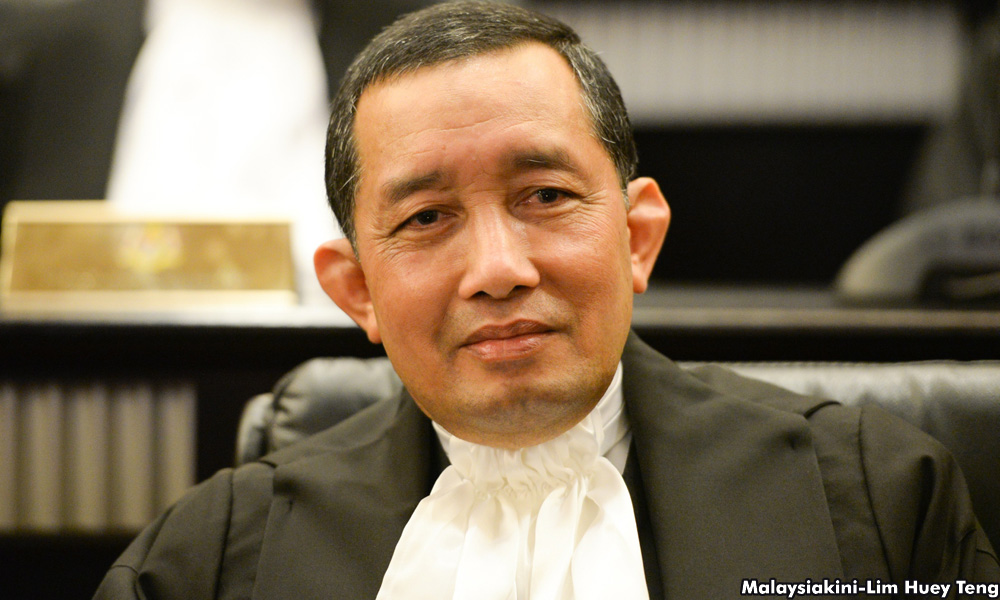MP SPEAKS | In response to Pengerang MP Azalina Othman Said's comparison of film producer Riza Aziz's discharge agreement to former finance minister Lim Guan Eng’s case, such a comparison is making a fallacious argument called ad hominem tu que or a “you too” argument.
It seeks to attack the opponent by alleging hypocrisy or that the opponent has not acted consistently without reference to the actual case itself. Such an argument seeks to divert attention from the merits or the logic of the arguments in the case itself.
The simple answer to the Pengerang MP is that the facts and circumstances of Lim’s case are totally different and completely irrelevant to Riza’s (above) discharge agreement. Even if there is anything wrong in Lim's discharge, which is denied, two wrongs do not make a right.
The urgent need for a full and frank explanation on Riza’s discharge agreement is because public confidence in the law has been shaken. Why is Riza’s discharge agreement treated like an illegitimate child? No one is stepping forward to take responsibility or to answer how public interest is served by discharging Riza on these terms.
Sarawak Report says the attorney-general's (AG) desk is now full of representations for a similar discharge by others. There is a real risk the perpetrators may be discharged before the next Parliament sitting on July 13.
My answer to the Pengerang MP’s issue on the separation of powers and the independent discretionary powers of the AG are set forth in my reply to Beaufort MP Azizah Mohd Dun below.
I am responding to two points raised by Azizah on my statement relating to Riza’s discharge agreement. The public is entitled to a full and complete explanation for the sudden change in direction on the prosecution of these 1MDB cases.
Covid-19 and the movement control order (MCO) are not acceptable excuses for why this explanation is not forthcoming.
The other points raised by the Beaufort MP, unfortunately, are argumentum ad hominem, that is, they are part of a fallacious argumentative strategy whereby genuine discussions of the issues are avoided by attacking the character or personal attribute of the person making the argument rather than the substance of the argument itself.
I do not wish to be distracted from answering the substantive issues nor to dignify fallacious arguments with a reply to them.

First point: AG's discretion is not unfettered and absolute
Azizah (above) said that I ought not to ask the questions because the AG's prosecutorial discretion to charge or discontinue proceedings under Article 145(3) of the Federal Constitution is unfettered and absolute. This is not correct.
The common law jurisdictions provide the AG or officer responsible for prosecutions, a wide but not unlimited prosecutorial discretion to charge or to discontinue proceedings.
The wide scope of prosecutorial discretion given by the courts is premised on the doctrine of separation of powers. The courts also recognise that matters relating to policy and public interest considerations are not susceptible to judicial review because it is not within the constitutional or practical competence of the courts to assess their merits.
However, it is accepted in all jurisdictions that prosecutorial discretion is not unfettered. The exercise of prosecutorial discretion is not immune from judicial review. Where the situation requires the courts in Malaysia, Singapore, the UK, US, Canada, Fiji, Mauritius and Trinidad and Tobago have reviewed decisions of independent prosecutors and investigators.
Raja Azlan Shah as acting chief judge in the Federal Court case of Pengarah Tanah Dan Galian Wilayah Persekutuan v Sri Lempah Enterprise Sdn Bhd (1979) 1 MLJ 135 said:
“Unfettered discretion is a contradiction in terms… Every legal power must have legal limits otherwise there is dictatorship. In particular, it is a stringent requirement that a discretion should be exercised for a proper purpose, and that it should not be exercised unreasonably. In other words, every discretion cannot be free from legal restrain; where it is wrongly exercised, it becomes the duty of the courts to intervene.”
The Singapore Court of Appeal in The Law Society of Singapore v Tan Guat Neo Phyllis (2008) 2 SLR (R) 239 said in reference to the prosecutorial discretion conferred by Article 38(3) of the Singapore Constitution, which is similar to our Article 145(3), as follows:
“The discretionary power to prosecute under the Constitution is not absolute. It must be exercised in good faith for the purpose intended, to convict and punish offenders, and not for extraneous purpose… all legal powers, even a constitutional power, have legal limits. The notion of a subjective or unfettered discretion is contrary to the rule of law.”
The House of Lords in the United Kingdom case of R (Corner House Research) v Serious Fraud Office (2009) AC 756 said:
“It is accepted that the decisions of the director (director of public prosecutions) are not immune from review by the courts, but authority makes plain that only in highly exceptional cases will the court disturb the decisions of an independent prosecutor and investigator.”
The House of Lords said the courts will review prosecutorial discretion where it has not been properly exercised:
“Of course, and this again is uncontroversial, the discretions conferred on the director are not unfettered. He must seek to exercise his powers so as to promote the statutory purpose for which he is given them. He must direct himself correctly in law. He must act lawfully. He must do his best to exercise an objective judgment on the relevant material available to him. He must exercise his powers in good faith, uninfluenced by ulterior motive, predilection or prejudice.”
Second point: Is the discharge agreement in public interest?
The Beaufort MP said that the prime minister’s open approval or disapproval of the discharge agreement will be interfering with the independence of the AG.

Putting political pressure by threats explicit and implied on the AG to prosecute or to discontinue proceedings is interference. Seeking an explanation for discontinuing high profile cases is not. Such an explanation is important for upholding the rule of law, maintaining confidence in prosecutorial independence, accountability and good governance.
Public statements enhance the credibility of prosecutorial decisions and also have a positive effect on public confidence in the independence of the AG. Silence, where disclosure is required, produces a negative effect.
In Regina v Director of Public Prosecution Ex parte Manning (2001) 1 QB 330, the public prosecutor declined to prosecute an officer involved in the death of a prison inmate while under remand.
The court said that in the absence of compelling reasons, the director of public prosecutions is expected to give reasons to vindicate his decision by showing that solid grounds exist for what might otherwise appear to be a surprising or even inexplicable decision.
The chief judge added, he would be very surprised, if members of Parliament do not welcome such a practice of providing reasons which good administrative practice requires.
In Canada, after the Parliament of Canada’s ethics committee found that Prime Minister Justin Trudeau had improperly pressured the AG to not prosecute a large company, SNC-Lavalin, the committee companion report recommended that the AG be encouraged to explain the reasons when taking over a prosecution or when declining to do so, in cases which raise significant public interest.
Public accountability comes in the form of demands for explanations of significant public interest cases. Where legal proceedings relate to government actions, there is harm to the government by not providing an account to the public of its activities.
Applying the above principles to the discharge agreement, an explanation by the prime minister and the AG is required. The statements by the MACC and the AG have raised more questions than answers. If we accept the AG’s explanation, it appears he acted mechanically by following former AG Tommy Thomas’s decision (which Thomas has creditably denied).
This raises concern whether the AG exercised the powers granted to him by applying his mind to the facts and circumstances of the case. A glaring omission is the AG has not explained how the discharge agreement is for the public good, in maintaining law and order and to uphold the rule of law.
How is the discharge agreement in the public interest? How does the government benefit in discharging Riza through his returning of assets worth only half of the amount stolen, when the fine for conviction is five times the amount charged (about RM5 billion) and under Section 426 of the Criminal Procedure Code, full restitution of the amount stolen can be ordered?
How does the government benefit when these are the same assets the US Department of Justice (DOJ) would have returned to the government?
The prime minister had before this, shown great courage and conviction to defy the then premier and the erstwhile AG to travel the length and breadth of the country to speak of his commitment to bring the 1MDB perpetrators to justice. Now one of those charged has been discharged.
The prime minister’s two-sentence statement does not explain how under his watch, the discharge agreement instils public confidence and that justice, the rule of law and public interest have been served.
Conclusion
Malaysian society has long grappled with the issue of ensuring better prosecutorial independence including a proposal to separate the positions of the AG and the public prosecutor.
The former chief judge Abdul Hamid Omar wrote in an article (The New Straits Times, July 15, 2018) that the proposal will not ensure greater prosecutorial independence because both their appointments and removal would still have to be made by the Yang di-Pertuan Agong on the advice of the prime minister.
Abdul Hamid rightly pointed out we cannot run away from the prime minister’s influence. In the end, he said prosecutorial independence depends on the character of the AG and that of the prime minister.
The Canadian Parliament ethics committee thinks a timely explanation for charging or discontinuing prosecutions will help instil public confidence on the independence of the prosecution.
Without an explanation on how public interest has been served by the discharge of Riza, Malaysians are left to draw their own conclusions as to what kind of AG and prime minister we have.
WILLIAM LEONG JEE KEEN is a PKR member and Selayang MP.
The views expressed here are those of the author/contributor and do not necessarily represent the views of Malaysiakini.


